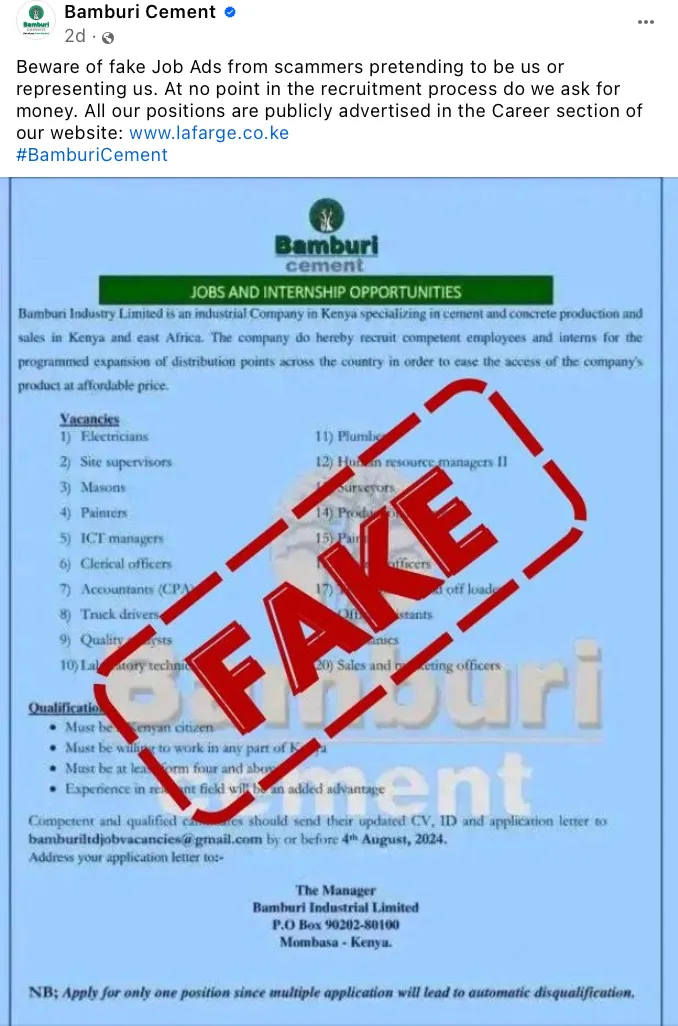HOAX: This poster advertising jobs and internships at Bamburi Cement is fraudulent

HOAX: This poster advertising jobs and internships at Bamburi Cement is fraudulent
The cement producer has disowned the poster.
This poster on Facebook purportedly advertising jobs and internship opportunities at Bamburi Cement Company is a HOAX.
According to the graphic, the cement production company advertised 20 job and internship opportunities.
Prospective job applicants must be Kenyan citizens, have cleared form four, have relevant experience and be willing to work in any part of Kenya.
An email address has been provided for prospective job seekers to submit their Curriculum Vitae (CV), application letter and National Identification card.
But is the poster authentic?
The poster requires applicants to send applications to a Gmail address, a red flag since Bamburi Cement uses a company-specific domain: [email protected]
Moreover, PesaCheck examined Bamburi Cement’s career portal and established no job openings as of 5 August 2024. The last positions advertised were Commercial Analyst and Commercial & Supply Chain Controller on 21 May 2024.
A review of Bamburi Cement’s X (formerly Twitter) account and Facebook page, where it conventionally shares such opportunities, did not yield the poster under investigation.
On 2 August 2024, the cement production company disowned the poster.
“Beware of fake Job Ads from scammers pretending to be us or representing us. At no point in the recruitment process do we ask for money. All our positions are publicly advertised in the career section of our website,” Bamburi Cement posted on Facebook.
PesaCheck examined a poster on Facebook purportedly advertising jobs at Bamburi Cement company and found it to be a HOAX.
This post is part of an ongoing series of PesaCheck fact-checks examining content marked as potential misinformation on Facebook and other social media platforms.
By partnering with Facebook and similar social media platforms, third-party fact-checking organisations like PesaCheck are helping to sort fact from fiction. We do this by giving the public deeper insight and context to posts they see in their social media feeds.
Have you spotted what you think is fake or false information on Facebook? Here’s how you can report. And, here’s more information on PesaCheck’s methodology for fact-checking questionable content.
This fact-check was written by PesaCheck fact-checker Rodgers Omondi and edited by PesaCheck senior copy editor Mary Mutisya and chief copy editor Stephen Ndegwa.
The article was approved for publication by PesaCheck managing editor Doreen Wainainah.
PesaCheck is East Africa’s first public finance fact-checking initiative. It was co-founded by Catherine Gicheru and Justin Arenstein, and is being incubated by the continent’s largest civic technology and data journalism accelerator: Code for Africa. It seeks to help the public separate fact from fiction in public pronouncements about the numbers that shape our world, with a special emphasis on pronouncements about public finances that shape government’s delivery of Sustainable Development Goals (SDG) public services, such as healthcare, rural development and access to water / sanitation. PesaCheck also tests the accuracy of media reportage. To find out more about the project, visit pesacheck.org.



